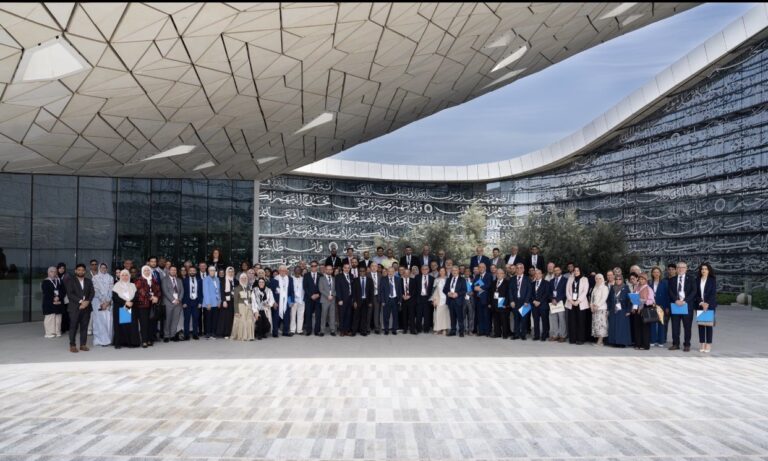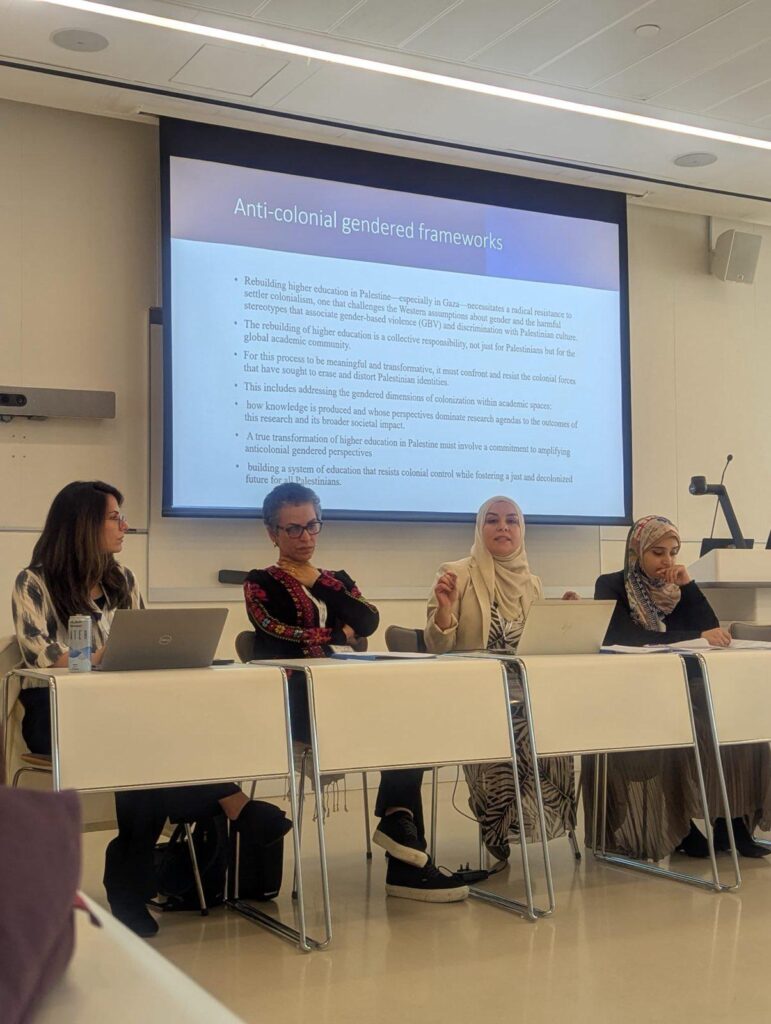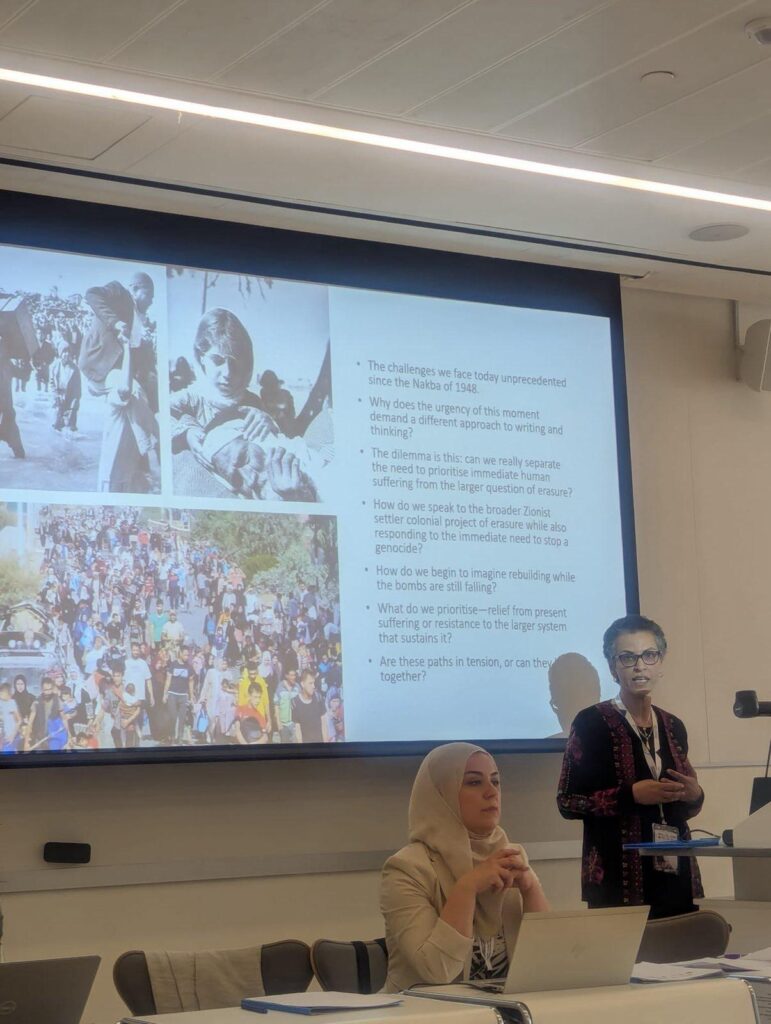Rebuilding Higher Education in Gaza
14–15 April 2025, Hamad Bin Khalifa University, Doha – Qatar
By Dr Rama Sahtout
Lecturer in Institute of Arab and Islamic Studies and School of Law, University of Exeter
Co-founder of ActforPal

From April 14 – 15, 2025, I joined scholars, students, university leaders, and development practitioners from around the world at Hamad Bin Khalifa University in Doha for the international conference ‘Rebuilding Higher Education in Gaza’. The conference was grounded in a spirit of solidarity and shaped through the collaboration of key partner institutions, including the Islamic University of Gaza, University of Fort Hare, the University of Johannesburg, the University of Glasgow, and the Institute of Arab and Islamic Studies at the University of Exeter — each playing a vital role in advancing this shared global effort.
The conference featured several plenary sessions and more than forty parallel breakout sessions, where scholars, researchers, and practitioners from a range of universities, institutions, and initiatives came together, and engaged deeply with critical themes: reclaiming the future of Gaza’s higher education, defying erasure, strengthening its resilience, harnessing technology as a tool for survival and growth, adopting feminist approaches to rebuilding, expanding global solidarity, and more. The ideas and proposals shared were urgent, innovative, and grounded in lived realities. Their call was clear: education must not stop even when the universities have been reduced to rubble. We must be ready to rebuild, not someday, but now.
On behalf of the Academic Action Network for Palestine (ActforPal), I participated alongside my colleagues Dr Afaf Jabiri and Dr Aseel Abuzour in a vital conversation — one that moves beyond humanitarian frameworks to focus on using the correct language, asking the right questions, and on reclaiming the future, voice, and status of Palestinians.
A Gathering of Conscience
This was more than a conference — it was a gathering of hearts, a call to conscience. In the face of devastation, institutions and academics from across the world came together—not just in response, but in resolve—forming the early threads of a coalition of care, woven with solidarity and stitched with hope. We came together with a clear understanding: rebuilding higher education in Gaza cannot — and must not — wait for Israel’s genocidal assault to end. For the Palestinian people, education is an existential need. In the face of destruction, the pursuit of knowledge becomes an act of resistance — a way of preserving identity, dignity, and hope. In Gaza, every classroom rebuilt, every lesson taught, is an act of resistance, a refusal to let injustice define the future.
Listening to Gaza
The opening plenary on the first day carried a clear message: we must listen to the people of Gaza — not speak for them, not dictate solutions. Their resilience demands our humility.
It is they who must lead; our role is to stand beside them, to learn from them, and to amplify their voices until the world can no longer turn away.
Speakers included senior academics from Gaza, such as Professor Nader Jawad Alnamara, Vice-President of the Islamic University of Gaza, who shared stories how students and staff refused to give up. Their stories were heart-wrenching yet deeply inspiring: students have volunteered across their communities, offering various kinds of support — including medical and psychosocial support — setting up new schools, and healing their society; a will that colonial violence cannot extinguish.
The session ended with a speech by Professor Sakhela Buhlungu, Vice-Chancellor of the University of Fort Hare — the historic cradle of African liberation leaders like Nelson Mandela. His words still ring in my ears: We are here to declare: South Africa stands with Gaza…. We will not work with Israeli universities — ‘full stop’. In that moment, the room vibrated with the recognition that true solidarity demands material, uncompromising action.
Unity and Refusal to Surrender
Throughout the conference, the spirit of solidarity remained strong. Leaders from major Palestinian universities — including the Islamic University of Gaza, Al-Azhar University, Al-Quds Open University, An-Najah National University, Al-Aqsa University, Birzeit University, and the Palestinian Commission for Accreditation and Quality — came together with international scholars and practitioners. Their united presence reaffirmed that rebuilding Gaza’s higher education must centre Palestinian voices and agency.
This message was evident in the next plenary session which brought together the Heads of Universities from Gaza and the West Bank, who spoke with painful honesty about the scale of destruction Israel has inflicted on Gaza’s higher education sector. They talked of devastating numbers — thousands of students and academics killed, lost under the rubble, displaced, or injured. Yet alongside the devastation, they talked of the collective refusal to surrender.
Speakers included Professor Omar Melad, President of Al-Azhar University, who described the catastrophic losses yet insisted on the university’s enduring spirit, Professor Jehad Albatsh, Vice President of Al-Quds Open University, and Dr Saida Affouneh, Dean, An Najah University.
The assault on Palestinian education is not new; it has been ongoing since 1948. But the Palestinian spirit, nourished by global solidarity, remains unbroken. This resilience is birthing something extraordinary: a new theory of education born out of destruction — a pedagogy for survival after scholasticide.
A number of initiatives are ready to be implemented, including the UNISAT E-Campus — a project envisioned as a safe educational space under the protection of a state flag were outlined. Yet, in Gaza, there is no safe place left; the reality on the ground has made such initiatives impossible to realize. Students in Gaza — those who can walk — would walk three hours just to reach an internet point. Displacement, martyrdom of professors, loss of campuses — all these are daily realities. Yet hope, expertise, and love for the homeland endure — and clear action plans and frameworks for rebuilding is the way forward.
On the second day of the conference, throughout the plenary sessions and breakout sessions, speakers highlighted among other topics the importance of transformative partnerships — between universities, across borders, and within communities.
Institutions across the world should be stepping forward with offers of support: joint research, distance learning, academic exchange, training and volunteering, sending materials, and forming a coalition of universities to sustain education in Gaza; as one delegate wisely noted, it is not only about money—it is about meaningful partnerships.
From Geneva to Amman, there was a clear call for global leadership rooted in conscience—not bureaucracy. We were reminded that education in Palestine is joy. It is cultural, collective, and vital to survival.
How? Amid a genocide?
Critical questions burned through the discussion: If people are starving, how can they be expected to pay tuition fees? How can education continue under the weight of genocide and starvation? Students themselves spoke with raw honesty: while online learning offers a lifeline, what they truly crave is human connection, the chance to gather, to build solidarity, to feel alive in community again. Another urgent reminder came from the floor: as we focus on rebuilding higher education, we must not overlook prior education. Without functioning schools, without the foundations laid by primary and secondary education, two generations risk being lost — and without them, there will be no future for higher education.
This struck a deep chord with me. Every time we speak about universities in Gaza, we must also speak about UNRWA — and the attacks by Israel on this agency, which has provided education to Palestinian refugees for decades. Education is not a privilege — it is a right, a legal obligation of the occupying power (using international law terminologies) to uphold – even in the shadow of genocide, this truth must not be forgotten.
Talking of the UN and its agencies, the absence of UNESCO, in particular, has been noted — offering neither tangible support nor the dignity of public advocacy. A question remained unanswered: Where is UNESCO’s press release? Where is the formal recognition of Gaza’s academic annihilation?
Amid discussions on rebuilding education, one powerful theme echoed: the central role of women in Gaza’s struggle and survival. What does women’s empowerment truly mean in Gaza, where survival itself is an act of resistance, and women bear the weight of shattered homes and fractured futures? Amid a genocide, it is not abstract strength but fierce necessity that drives Palestinian women to hold their communities together. Even as bombs fall, mothers strive to educate, nurture, and protect. Yet resilience without resources is not resilience—it is endurance stretched to its limit. For women, especially those with disabilities, the challenges are not only vast but deeply layered. Still, their courage calls us to action, to build real, inclusive support grounded in justice. The next question was where are the voices of Western feminists in the face of the suffering endured by women in Gaza? Where is the outcry against the daily realities of displacement, loss, and survival amid genocide? Feminist, anti-colonial frameworks fall hauntingly silent when it comes to Palestine. This selective application not only reveals a troubling double standard but undermines the very universality of feminist solidarity.
A Coalition of Care
As the conference closed, the call was clear: we must decolonize our understanding of education.
We must support Gaza not only with materials but with moral clarity — we must use the right language and ask the right questions.
The conference was a collective act of defiance against despair. If we listen — truly listen — Gaza’s students and scholars will teach us not only how to rebuild universities, but how to reimagine a future rooted in dignity, justice, and liberation.
This conference follows the earlier gatherings, including conferences organized by Fobzu in collaboration with the Centre for Public Policy Research (CPPR) at King’s College London (June 2024) and the University of Glasgow (December 2024), and forms part of a growing series of international efforts, with a third conference already being planned. Deep gratitude is owed to the organising committee — especially Professor Sultan Barakat, whose tireless leadership made this possible — as well as to other key contributors, including Professor Alison Phipps and many others whose commitment continues to shape this vital work.
We hope to see this Coalition of Care grow, and universities everywhere joining in, standing with Gaza to reimagine education as an act of justice, healing, and shared humanity. Let our solidarity and actions speak louder than silence.


